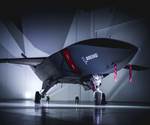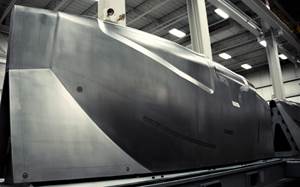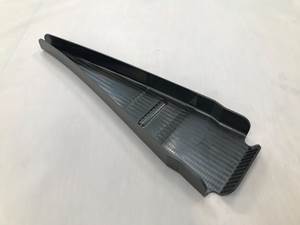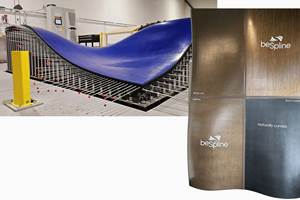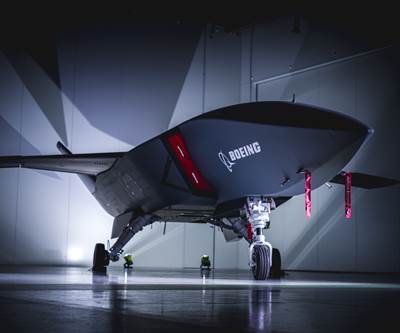Spirit AeroSystems Belfast advances LANCA project concept with resin transfer infusion
Spirit AeroSystems Belfast, Northrop Grumman and Intrepid Minds support further development of the Royal Air Force’s unmanned Lightweight Affordable Novel Combat Aircraft (LANCA).
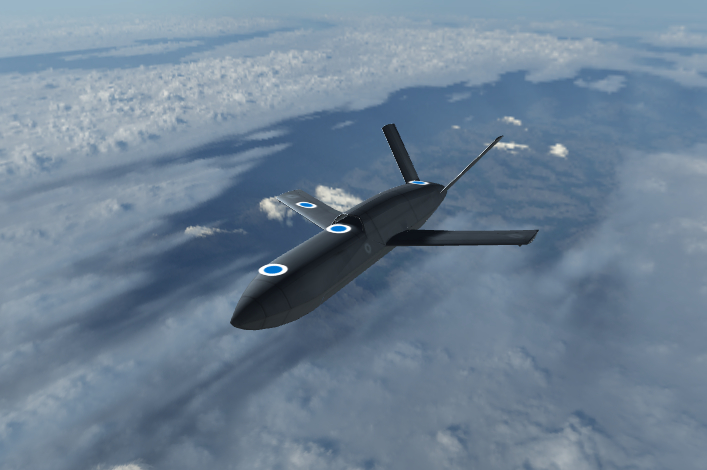
LANCA aircraft concept. Photo Credit: Royal Air Force
Spirit AeroSystems Belfast (Northern Ireland) announced on April 27 it will lead Team MOSQUITO, comprising Spirit Belfast, Northrop Grumman (London, U.K.) and Intrepid Minds (U.K.), on further development of the Royal Air Force’s (RAF) Lightweight Affordable Novel Combat Aircraft (LANCA) concept to full demonstration capability. Initially supporting more than 100 STEM jobs at Spirit Belfast’s facility, the project has the potential to sustain further expertise in the wider U.K. supply chain, and aims to deliver dramatic reductions in traditional cost and development timelines for combat air systems.
Exploiting agile design principles, sophisticated digital applications and advanced manufacturing skills, the team will generate knowledge and evidence for a potential follow-on project. Findings could lead to this capability being deployed by the RAF to enhance protection, survivability and information advantage to aircrews.
Drawing on its expertise in advanced composite manufacturing solutions, Spirit Belfast says it will adapt its resin transfer infusion technology to produce a lightweight vehicle capable of uncrewed, high-speed flight. Benefits of using extensive composite components, compared to all-aluminium aerostructures, include both reduced maintenance and fuel consumption for aircraft operations.
“Spirit Belfast is delighted to lead the delivery of a national program enabling the development of cutting-edge technologies while maintaining critical skills in the U.K.,” says Scott McLarty, senior vice president of Spirit AeroSystems, Airbus Programs. “Supporting the MOD’s [UK Ministry of Defence] strategic objectives on pace, affordability and operational capacity, Team MOSQUITO will help drive collaborative innovation and competitive advantage. We are excited to develop this relationship with a view to contributing to a more sustainable industrial base for U.K. defense.”
In addition to the provision of systems engineering support, Northrop Grumman will supply its international DA/RC (Distributed Autonomy/Responsive Control) technologies, gateway offerings and advanced mesh networking capabilities to the aircraft. These are said to enable seamless human-machine collaboration and cooperative mission management across distributed manned and unmanned assets.
“Our team will help deliver the required development cost and time savings by providing our expertise in Agile development and DevSecOps to enable a model-based, digital design approach,” says Katharine Sealy, director of National Security Solutions, Northrop Grumman UK. “By applying modern software development practices to a digital engineering environment, we aim to dramatically reduce the time required to build a flying demonstrator while allowing for seamless integration of additional future capabilities.”
Further, Intrepid Minds will reportedly cover the complete avionics system, power, lighting and integration with the ground control station. As part of this project, the company brings its own Adrestia system currently being deployed across the air, surface and subsurface domains. Having already integrated into many civil and defence systems, Intrepid Minds is using that speed of development to generate a cohesive structure across all partners and suppliers.
“As specialists in the unmanned and autonomous field, Intrepid Minds has a proven record in developing the art of the possible,” concludes Intrepid Minds Managing Director, Adam Smith. “Our ability to pull in the best technologies from suppliers and integrate them centrally with our Adrestia system and Spectre hardware can rapidly enhance a system of systems approach. We are delighted to be involved in developing potential U.K. sovereign capability in ways that could work across the services.”
Related Content
Carbon fiber, bionic design achieve peak performance in race-ready production vehicle
Porsche worked with Action Composites to design and manufacture an innovative carbon fiber safety cage option to lightweight one of its series race vehicles, built in a one-shot compression molding process.
Read MoreNine factors to consider when designing composites cure tooling
Gary Bond discusses the common pitfalls and compromises when designing good cure tooling and their holistic significance for a robust composite production process.
Read MoreASCEND program update: Designing next-gen, high-rate auto and aerospace composites
GKN Aerospace, McLaren Automotive and U.K.-based partners share goals and progress aiming at high-rate, Industry 4.0-enabled, sustainable materials and processes.
Read MorePlant tour: BeSpline/Addcomp, Sherbrooke, QC, Canada
Composites automation specialist increases access to next-gen technologies, including novel AFP systems and unique 3D parts using adaptive molds.
Read MoreRead Next
Boeing announces first unmanned Loyal Wingman defense aircraft
The first of three prototypes, the Loyal Wingman’s artificial intelligence application and its use of composites soars above the milestone set for unmanned aircraft.
Read MorePlant tour: Daher Shap’in TechCenter and composites production plant, Saint-Aignan-de-Grandlieu, France
Co-located R&D and production advance OOA thermosets, thermoplastics, welding, recycling and digital technologies for faster processing and certification of lighter, more sustainable composites.
Read More“Structured air” TPS safeguards composite structures
Powered by an 85% air/15% pure polyimide aerogel, Blueshift’s novel material system protects structures during transient thermal events from -200°C to beyond 2400°C for rockets, battery boxes and more.
Read More

